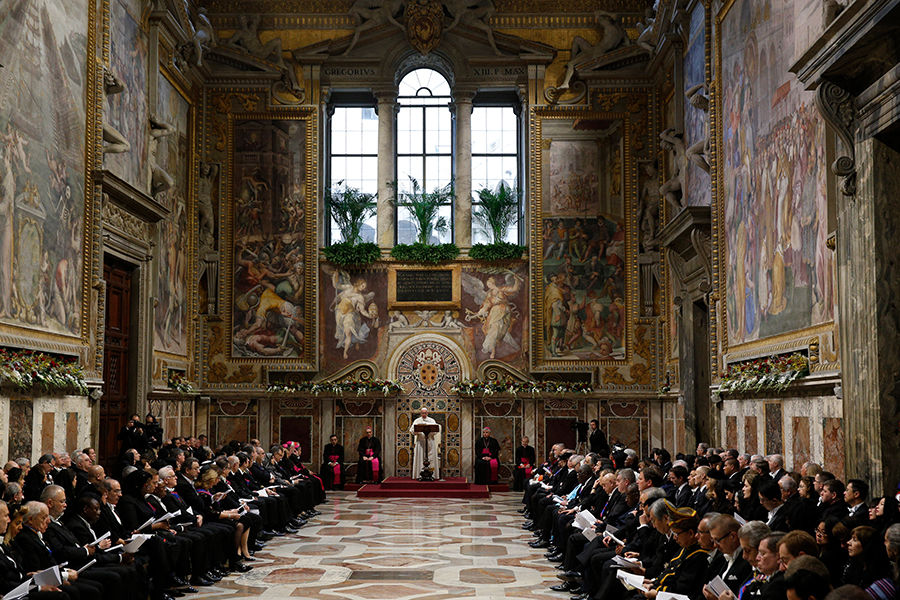From the beginning, Pope Francis has been a notoriously difficult figure to classify by the usual Western standards of left vs. right — seemingly quite progressive on many matters, and yet stubbornly traditional on others.
His Jan. 8 annual address to diplomats accredited to the Vatican, generally considered the pope’s most important foreign policy speech of the year, brought a vintage example of Pope Francis defying the conventional taxonomies.
He took up all the familiar social justice causes, where the world has become accustomed to seeing the pope as a voice for progressive positions:
> Environmental protection, with Pope Francis reiterating his conviction that human causation is an important factor in climate change.
> Immigration, where the pontiff complained that too often today’s rhetoric serves only in “stirring up primal fears.”
> “Ready access to medical care and treatment on the part of all … at affordable costs” as a basic human right.
> Opposition to the proliferation of weapons, and strong support for efforts at nuclear disarmament.
> Clear, if indirect, disapproval of the recent transfer of the U.S. embassy in Israel to Jerusalem, reiterating the Vatican’s support for the status quo.
On the other hand, Pope Francis framed his remarks on Monday in the context of the 70th anniversary of the Universal Declaration of Human Rights, adopted by the newly formed United Nations in 1948.
While applauding the document’s impact, Pope Francis also warned: “Debatable notions of human rights have been advanced that are at odds with the culture of many countries. The latter feel that they are not respected in their social and cultural traditions, and instead neglected with regard to the real needs they have to face.”
He added: “Somewhat paradoxically, there is a risk that, in the very name of human rights, we will see the rise of modern forms of ideological colonization by the stronger and the wealthier, to the detriment of the poorer and the most vulnerable.”
Pope Francis has invoked the phrase “ideological colonization” many times before, and in general it refers to affluent Western nations making the adoption of liberal sexual ethics a condition of overseas aid programs.
For example, many African bishops have reported over the years that Western governments or NGOs may offer an African nation assistance to build roads or markets, but on the condition that it adopt a certain sexual education curriculum in its schools or make the distribution of condoms a greater part of its anti-HIV/AIDS efforts.
Pope Francis also offered a ringing endorsement of the pro-life cause, lamenting that “innocent children are discarded before they are even born, unwanted at times simply because they are ill or malformed.”
Later in the speech, he issued a strong defense of the traditional family, defining it as “that faithful and indissoluble communion of love that joins man and woman,” and linking declining respect for the family to a “demographic winter” in some parts of the world marked by historically low fertility rates.
The pontiff also spoke forcefully on the need to defend religious freedom, “including the freedom to change religion,” which was a direct challenge to anticonversion laws in several nations around the world.
“Sad to say, it is well-known that the right to religious freedom is often disregarded, and not infrequently religion becomes either an occasion for the ideological justification of new forms of extremism or a pretext for the social marginalization of believers, if not their downright persecution,” he said.
Pope Francis praised the growth of a global culture of human rights in the post-World War II period in strong terms. At the same time, however, he said that looking around, there are whole categories of people whose rights are routinely denied, citing the unborn, the elderly, “women who repeatedly suffer from violence and oppression” and victims of human trafficking, as well-known examples.
A true defense of human rights, the pontiff argued, involves a broad social agenda, including ensuring access to health care and “actively striving for peace,” without which, he said, “integral human development” is impossible.
As he has in the past, Pope Francis urged serious efforts at disarmament as an antidote to which he’s described as a “third world war being fought piecemeal,” meaning in a variety of chronic, unresolved and sometimes ignored conflicts around the globe.
In terms of broad themes, the pope focused on the family and immigration.
“Disregard for families has another dramatic effect — particularly present in some parts of the world — namely, a decline in the birth rate,” he said. “We are experiencing a true demographic winter! This is a sign of societies that struggle to face the challenges of the present, and thus become ever more fearful of the future, with the result that they close in on themselves.”
On immigration, Pope Francis said that “today there is much talk about migrants and migration, at times only for the sake of stirring up primal fears.”
“There is a need to abandon the familiar rhetoric and start from the essential consideration that we are dealing, above all, with persons,” the pope said.
Pope Francis also defended what he called a right to employment, including protections for workers from excessive demands of employment.
“Demands of profit, dictated by globalization, have led to a progressive reduction of times and days of rest, with the result that a fundamental dimension of life has been lost — that of rest —which serves to regenerate persons not only physically but also spiritually,” he said.
This intriguing blend of positions that cut both left and right ran through the pope’s 5,000-word address, before ambassadors representing the bulk of the 185 nations with which the Holy See has diplomatic relations — 89 of which maintain embassies in Rome, with the rest naming nonresidential ambassadors.

